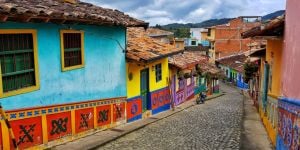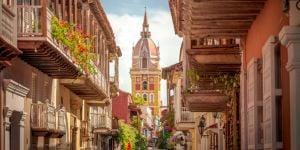Clarifying Tax on U.S. Expats in Colombia
Subscribe to the topic
Post new topic
or pay Deloite Touche or PWC , who both have Colombian offices and personnel, and understand the fine details, $10,000 US minimum for their interpretation. @Nico Peligro
Nah, Just buy their tax guide for around $30 which provides easy to follow "notas" that interpret the rules.
XXX:https://legalytributarioenlinea.co.pwc.com/co/index.php?id_cms=38&controller=cms&id_lang=4
By the way Peligro, "Langon Law" asks for a copy of your 1040 return when they prepare Dian's form 210, which shouldn't be a problem for most expats since the Colombia filing period takes place between August to October while in the U.S. it is normally around April.
I am curious whether all those expats that you know who underreport their income have a plan for providing pertinent documentation in case they audited, and whether they have structured their portfolios back home in such a way that it facilitates the evasion of taxes in Colombia?
@N.Barley I am not a US resident, and they would charge several million pesos to interpret my tax return and tax situation, and I doubt they would be able to figure it out.
Besides that, my Country has a Tax Treaty with Colombia, so dont follow the same rules as you guys,
Giving Langdon Law and thus DIAN all your personal financial information is like giving the Fox the keys to the hen house, in my opinion-
I have nothing against Langdon Law, as a matter of fact, I may consult them on my next visa, which is very important, since they have such high recommendations.
I wont be using them for any thing related to taxes, though
@N.Barley As I said , I have been here living 11 years, know dozens of Expats, and NEVER heard of an Expat gettting audited on their OVERSEAS income and assets (CAPS for emphasis)
Have you?
I am in no way implying that this could never change.
@windboater It seems that you have just come here to argue and don't know what you are talking about. What is your problem? You already said you were not going to move here. Your sentence structure is not correct English. You keep saying you are low income yet allude to having Roth, Savings, Dividends, SS and other income. What you post does not make any sense at all. I am dumber for having read them other than to conclude that I need to consult a sharp tax advisor and double check that they are correct. After all Columbia IS South America. Not exactly a bastion of economic or political stability. Columbia has improved dramatically since the cartel days in the 1980s. I hope to visit soon.
@drpeterjstanton You do realize that you are responding to windboater who last posted in 2020, right?
People who havent been here for even a visit and cant even spell the name of the country should be dead last of those who even waste a minute worrying about tax laws in Colombia
Incorrecto, Nico.
Prospective Expats have every right to consider
and discuss the tax laws even before their first
visit. It is a legit part of due diligence.
All members of this Expat.com forum have a
right -- as opposed to being ¨dead last¨ -- to be
concerned and express a view or ask their
questions.
Let freedom ring.
cccmedia, Designated Expert, Colombia Forum
@cccmedia I guess I am free to express my opinion that he shouldnt worry about things like taxes when he hasnt even set foot in the country then, right?
Dont worry,be happy
Looks like I need to revise my 2023 tax projections for The grand Qi (real vs. monied). My guess is neither will have to pay Colombia taxes, although they may still be required to file.
According to the FAQ section of a recent blog post on the EG website:
If I receive a pension in the USA but I live in Colombia, do I have to pay taxes? If you are a tax resident in Colombia and a pensioner in the USA or another country abroad. Consequently, you must file your income tax return, and, starting in 2023, the monthly value of your pension will be considered tax-exempt, which means that you will not necessarily have to pay taxes on it.
I then looked for confirmation and found this excerpt from a site called CM Legal:
- The new legal situation
- Under the new legislation, Colombian-source pensions and foreign-source pensions are treated equally. Accordingly, all pensions, whether Colombian-sourced or foreign-sourced, are treated tax-free up to a monthly allowance of 1,000 (UVT = unidad de valor tributario). 1 UVT in 2023 is COP $42,412. Accordingly, the monthly tax-free amount is COP $42,412,000 (approx. USD $8,900, as of December 17, 2022).
- Bottom line
- The equal treatment of Colombian and foreign pensions represents an enormous advantage for foreign pensioners. The political decision to essentially exempt foreign pensions from income tax was made by the new Colombian government with the motivation to make Colombia a more attractive location for expatriate pensioners. One can assume that this calculation will work out.
I have to laugh at the statement "Colombian government with the motivation to make Colombia a more attractive location for expatriate pensioners," since denying pensioners access to EPS, whose premium is not based on either age or pre-existing conditions, makes it less attractive.
N.Barley I think it is a huge positive development for expats wanting to reside in Colombia full time. It is also promising in the fact that it demonstrates that the government realizes the value of having expats spend their money in country and I believe/hope that they will continue to make incentives such as improving their health insurance legislation. Of course all of this is kind of like playing with used douche water. It is okay to play around with it, run your fingers through it but; I wouldn't swallow any of it.
Time will tell.
elp
@OsageArcher does a student visa exempt someone from the Colombian income tax obligation?
@OsageArcher does a student visa exempt someone from the Colombian income tax obligation?
-@jaso1983
Regardless of whether you are a student, or a teacher, or anything, if you are considered a tax resident and your income is over about 51 million COP you will have to file an income tax return.
The most basic determination of whether you are a tax resident or not, setting aside when one has Colombian children or wife that live in-country and other rules, is that if you spend more than 183 days in-country in any given 365 day period not necessarily a calendar year, you are considered a tax resident.
From DIAN, the tax agency of Colombia:
https://www.dian.gov.co/impuestos/perso … arios.aspx
The one that applies to almost all expats is this first condition (others follow but I have not included them):
"Se consideran residentes en Colombia para efectos tributarios las personas naturales que cumplan con cualquiera de las siguientes condiciones:
- Permanecer continua o discontinuamente en el país por más de 183 días calendario, incluyendo días de entrada y salida del país, durante un periodo cualquiera de 365 días calendario consecutivos, en el entendido de que cuando la permanencia continua o discontinua en el país recaiga sobre más de un año o periodo gravable se considerará que la persona es residente a partir del segundo año o periodo gravable."
As always, you are advised to contact a tax accountant in Colombia who knows the laws and the rules with respect to the situations of expats. But also be aware that under Petro, things may change and at this point no one really knows what may happen.
@Guest7953:
I have to laugh at the statement "Colombian government with the motivation to make Colombia a more attractive location for expatriate pensioners," since denying pensioners access to EPS, whose premium is not based on either age or pre-existing conditions, makes it less attractive.
Truth, but still, the fact that pensioners won't have to pay taxes out if their annuities in Colombia is in fact a big advantage, something not offered last year (if what we heard is correct).
From the Government's perspective, foreign pensioners of advanced age can represent a huge burden to a health care system with limited resources, even if they pay their part for EPS.
One way you could go around it, is by getting a visa type where you'd be elegible to get EPS, if you could also be elegible for that type of visa. For instance, under the Property Visa Owner, if you can afford to buy an apartment or flat for about 406 millions of pesos (about $87,000 in today's exchange rates), you can get that visa, and then once you get your regular visa, you could sell that flat and rent instead.
That's a possibility BUY YOU'D HAVE TO CHECK WITH A TAX ACCOUNTANT or ATTORNEY to make sure this information is accurate.
This is a quotation from another site. I am not sure if I'd violating the terms of use of this forum; so I will not mention my source, but it's from a Colombia visas website:
Applicants for property investment visa are allowed to enroll into the EPS. A small rewrite of EPS section can still state now that EPS as of October 21, 2022 is not a requirement for visas but its still a cheap and great insurance to cover you in Colombia. The EPS payments are still 5% of your income by law. Pension visa holders are now exempt from this requirement as the new visa law prohibits them from obtaining this insurance.
But then again, remember also what they advice here, "Thou shalt not buy a property within the first year" (kinda of teasing  ) and in that case, you'd have to get temporary a pensioners visa, for instance, or comeback after some tourist visa stay. With the right local connections, however, and with due diligence; maybe you may decide to buy property before a year. I think I'll do that too (I'd have to think seriously about the right city with the right weather for me too).
) and in that case, you'd have to get temporary a pensioners visa, for instance, or comeback after some tourist visa stay. With the right local connections, however, and with due diligence; maybe you may decide to buy property before a year. I think I'll do that too (I'd have to think seriously about the right city with the right weather for me too).
Finally, and again, just don't forget to check with 5 tax accountants (that also seem to be conventional wisdom in this forum, and I'd think I'd agree with it, because not all accountants are familiar with doing taxes for expats), and especially because this would be the first year these new immigration laws apply.
Easy to buy property in Colombia, not so easy to sell it and get your money back.
There is the option of moving out of Colombia to a perfect country. I tried that. But Colombia is like no other country. I can’t quit Colombia. I’m going for dual citizenship, EPS, DIAN, President Petro, the whole enchilada. Vamos a vivir sabroso!
I think Ecuador makes it even easier too for Expats, especially if you have a college degree or something like that, but even without that, I think the options are there. If dollar starts getting weaker, that may be an more attractive option. The YouTube channel of Amelia And JP got lots of information about that country.
Peru also has a residency visa for pensioners. No taxes, but under that very specific visa. The food is my favorite (well I'm being biased too, since I grew up there), but I think there are Peruvian restaurants in Colombia too (if you have not tried Aji de Gallina or Peruvian cebiche, you don't know what you are missing!). I'd consider living in Lima, but real estate there is "por las nubes" (too expensive).
Paraguay is another option; it's the new Argentina for Germans and other Europeans, that is, good Germans in this case that run away from COVID despotism (one of the things I don't like from the Europe, but that's a very personal opinion, I hope nobody gets offended); but Paraguay is farther away from the USA. I think real estate prices are also more expensive than Colombia. Argentina is full in crisis, and I think the taxes would kill you as an expat (not 100% sure, I did research very briefly, very little). It's kinda of a new Socialist country (that from the news) in my humble opinion. I don't think Bolivia has a visa program for pensioners or those with annueties with fixed passive income. I might be wrong.
Panama and Costa Rica also offer advantages for pensioners, and probably for other type of expats too; but it seems to me that these two little countries real estate prices are a little bit higher than what I like. Nicaragua is cheaper, but people complain about lack of infrastructure and, more recently, political instability.
Mexico for me is too dangerous, and also cost of living is higher than in Colombia. However, since it's close to the US, many American expats live there. Venezuela es super dangerous, and unless you got family there, it wouldn't make much sense. I've seen nice apartments there online for sale for $7,000 USD.
Colombia has one of the lowest Cost of Living expenses according to the 2023 Numeo List, and from other sources too. It has some good cities to live by the weather, although I feel Medellin is getting a little bit expensive, from what I see in real estate directories (never been there, but I've been in other Colombian cities).
I thought about buying real estate anyway. I don't want to pay rent, but I'll have to at the beginning.
"iVamos a vivir sabroso!" -- I'd agree, las sen~oritas se ven sabrosas tambien 
@Laker4115 Easy to buy property in Colombia, not so easy to sell it and get your money back.
I read that in this forum too, probably from you. That I wouldn't know. I'd think that if you'd spend your time looking for a competitive deal in real estate, later on, it will be easier to sell if you want to do so.
That being said, I noticed you wrote from Pereira, one of the cities I am considering to move. One of the reasons is precisely I've seen very competitive real estate prices compared to other cities in Colombia (especially for apartments in estrato 4 or more). I also saw somewhere that the prices for M2, in average, is one of the lowest among the large Colombian cities. I think I read one guy was going to move to Cucuta, because of the lower cost of living, but at the end he chose Pereira or Armenia. I don't remember his alias in this forum.
I'd read Pereira is just a little bit humid (which in my case would be great for my eyes, but I don't want it muggy either), but otherwise with a weather almost similar to Medellin. However, I also read that crime is not as low as Manizales, but still lower compared to Cali and even Bogota. I don't like heat, but if I find bargain real estate in Cartagena or Santa Marta, for instance, I'd move out there. I am also planning to invest a little bit in a couple of flats to see how that goes, and rent one at least. I speak the language, although I am not originally from Colombia.
I'd appreciate any feed back -- if you don't mind. Is Pereira too hot in your opinion? (I've seen the stats, but that doesn't beat personal opinions). Are there nice neighborhoods in the coolest parts of Pereira (I've read about the city micro-climates). I'd like it a little bit cold, probably like Manizales, which is also in my watch list. Do you feel buildings there are well-prepared for earthquakes? (I think there was a huge quake in 1999 in nearby Armenia).
Are crimes a real problem in Pereira? (again, I've seen the stats, but that's doesn't always offer the whole picture). I and my adult son, who has a small level of autism, can probably pass off as Colombians to avoid thieves who target tourists -- until we open our mouth to speak, especially my son who was born in the USA.
Gracias.
Lots of people giving tax and other advice on here who dont live here, havent been here, only been here on vacation.
Sure you can go to the DIAN or PWC , Deloite Touche websites you can try and interpret the rules as written and figure out you " legally" could be paying a lot more taxes living in Colombia.
But ask any of the rich Colombians ..the 0.1% or 0.2% 50,000 plus people living here who have substantial assets in Colombia and abroad, whether they pay taxes on their overseas assets and income, or even near the full legal book amount on their Colombian assets and income.The answer will be 99% "no".
Same with expats who have been here 10 plus years.
Alot of hulabaloo on these expat sites.
I don't know if I'd like to live in Colombia and doing things like skipping taxes, to put it kindly. There are other countries without wealth and pension taxes too. Even if you love Colombia so much you can't help it -- and some people do -- there is the option of living there about 6 months so you don't become a tax resident. You don't need to live in Colombia several years to know that.
I grew up in South America, and thus I know that authorities can be relaxed when doing taxes, but there is always the chance of getting caught, and when taxes get accumulated over the years, the incentive of collecting big money is there. It's not about virtue signalling; it's about self-preservation. I don't think jails in Colombia are the best of the world either.
For American citizens, we still have to do U.S. income taxes reports to the IRS, thus that'd be harder to hide pensions or other type of annuity income to the Colombian government. Maybe if you are from other countries, that'd be easier. I don't know.
It's still better to be informed before going to the country than after. I know that tax accountants there are sometimes not very accurate (in the Medellín Numbeo page there is an example one one couple who went there and was misguided by an accountant). Still, it's better to talk to several of them to minimize risks. I mentioned 5 as a kinda joke, maybe three will do it, or at least two. Experience and knowledge of laws (in this case there is more knowledge than experience for laws that have changed relatively recently) is more important than numbers.
The issue, at least in the Numbeo case mentioned before, might be that some accountants are not specifically familiar with expat cases. That's why before last year, many thought that annuities from outside Colombia were not taxed either, but they were wrong. Again, I read that that has changed for the better.
I never tried to give tax advise. I was very clear that the options that I read from other specialized Colombia visa tax websites still need to be double check with experienced local tax accountants and even tax attorneys. We just need to explore the options because pertinent laws have changed just last year. Even a Colombia visa specialists told me back in January that he wasn't still sure of how these new laws will be applied.
That being said, personal experience or knowledge in laws just by living there 20 years won't give you much advantages like, let's say, experience in knowing the local culture. And, in that case, living there for a while is indeed very useful in that sense. Also, knowledge of neighborhoods, for instance, is very important to know what to avoid. Rules like "not giving papaya" are often overlooked until you experience crime.
That EPS elegibility has changed for certain visas, and that's also something to double check with the professionals (that's still better than checking with other expats or your best buddy). What I did was to quote from a specialist who has been living there for 17 years, if I recall well, and makes a living handling Colombian visas.
These chats and messages are still very useful for brain storming, to find out options you didn't know before, but we should not make financial decisions on what other say, especially about going around taxes. If there are loopholes, OK, as long as they are still legal.
People relying on Numbeo and internet gurus for advice..ok
The Colombian jails are so overloaded they are kicking murderers, rapists out..yeah sure they are gonna stick you in jail onn trumped up charges.
.yeah sure live in fear..never happen in the present environment..ridiculous..anyone who has lived here more thsn a few years knows it.
Colombia hasnt become Venezuela yet, however when and if it does, it will be pretty clear and you will have plenty of warning, and if they chuck you in jail for the slightest infraction ad you will be a political prisoner, and the objective will be to extract " vacuna," money.or favours from your government or family..and it wont matter how religiously you tried to follow the DIAN rules
.
Colombia is not kicking murderers and rapists out of the jails. Some 5,000 female prisoners in Colombia who are either impoverished or the heads of single parent households will be freed in exchange for community service. Good Petro decision.
Not everyone on this forum is a newbie. Some people on this forum were living in Medellín when the mayor was Alvaro Uribe Vélez, just after Uribe had given dozens of licenses to the narcos for planes and private airstrips for Pablo Escobar's drug trade.
"...en la administración de Uribe Vélez se firmaron más de 200 licencias que estaban relacionadas con aeronaves o pistas del Cartel de Medellín. 200 licencias."
(El Espectador, 11 diciembre 2021, "Licencias que matan")
@futuroexpat if you have been here long time (which does not seem apparent from your avatar name) then you know putting people in jail for tax reasons is baloney
Expropriating houses, apartments, businesss or bank accounts with a balance of over 30 salarios minimo- but not less (around 35 million pesos) yes, that will happen..but I personally havent heard of it happening to any foriegner.
@nico peligro How many wealthy Colombians live in Colombia? Many live in Miami now, Juannes is pratically the mayor of South Beach Shakira Maluma Miami is loaded with wealthy Colombians even more in the past few years
Now I am even more confused. Seems we need a USA 20 yr expat CPA living in Colombia who knows USA rules and Colombian tax rules. A person like this could have a nice business advising people. I'd pay for this. I agree that a part timer American or a native Colombian might not know both sides of the tax issues.
@drpeterjstanton The rules are independent from one another. I would imagine you have an accountant in the USA, get one in Colombia.
lpd
@lunamick You must be seaking "tongue in cheek".There re still a lot of weathy Colombians living here. Including billionaires
Remember 0.1% of 50 million is still 50,000
Yep , most of them have overseas assets and income they dont declare
Hi All - this is a gigantic thread and I admit I haven't read all of it. I wonder if the controversy of Roth IRA taxation was ever resolved. The claim that only Roth IRA withdrawals are counted as income in Colombia didn't make sense to me because those $ were funded after-tax and you don't know what mix of that withdrawal is money that you've already paid tax on and therefore simply count as prior savings.
If this has been clearly answered elsewhere, I'll happily read the whole thread and sorry in advance for wasting your time.
It would take an optimist among Expats to believe that
any five Colombian accountants would agree on the
taxable status of Roth versus traditional U.S. IRA's.
Most of those accountants may not know what a
Roth IRA is.
If a tax resident is not taking a distribution from any IRA in a
given year, it is reasonable to consider that he or she
is not liable to pay taxes for their IRA for that year
in any jurisdiction.
cccmedia in Santander
@cccmedia And would that exclude being liable for worldwide taxes?
Regards,
elp
@cccmedia Agree with your statement as to five different accountants. Another thing is that none of them will accept responsibility for their filings. YOU will be at fault for not telling them how to do their job or they will simply say they did not know. At any rate you are not going to find any that will agree that you should only pay any taxes owed and that they will be responsible for any penalties incurred due to their lack of diligence.
My approach for now it to avoid becoming a tax resident until I can get a better lay of the land when in Country. That said, I have found a few accountants in Medellin that are retired from the US and have pensions or IRA's etc. IF I become a tax resident I will likely mirror their actions.
regards,
elp
Looks like this topic is still alive and kicking! Much has changed since the first posts, and maybe there should be a new thread created each year with the hot items pinned at the top?
Here is a link to PwC tax summary, which is very clear and concise:
https://taxsummaries.pwc.com/colombia/i … velopments
From this resource, below are some items i personally found relevant to the decision to retire early from US to Colombia. If 401k/IRA assets are excluded the 'Equity/Wealth Tax', and perhaps IRA distributions excluded as income, then tax residency in Colombia may make sense in my case. Otherwise it's the Trifecta strategy of hopping among countries.
Significant Developments:
Foreign pension income is exempt from taxation up to TU 1,000.
Residence: (here it says = 183 and not > 183 days?)
A person is considered fiscally resident in Colombia if one remains in the country (continuously or not) for an aggregate period of time of 183 days within a period of 365 consecutive days.
Other Taxes - Capital Gains:
...inheritance and gifts are considered extraordinary income, and, as such, the heir/beneficiary will be liable to capital gains tax. (15%)
Other Taxes - Equity (Wealth) Tax: (no mention what assets are included/excluded, only net wealth)
Equity tax is applicable for individuals that meet the threshold as of 1 January of each year.
Triggering event is the holding of net wealth for tax purposes (assets less allowable liabilities) as of 1 January in excess of TU 72,000 (COP 3,053,664,000 for 2023).
I would be wary of any tax site that cannot get even the small details correct. So I will not post the link for that site.
In Colombia, it's called the UVT - La Unidad de Valor Tributario, not the TU.
The trigger for being considered a tax resident in Colombia is MORE THAN 183 days. From the taxing authority DIAN, Dirección de Impuestos y Aduanas Nacionales:
https://www.dian.gov.co/impuestos/perso … arios.aspx
The very first paragraph states the conditions (my bolding emphasis):
Se consideran residentes en Colombia para efectos tributarios las personas naturales que cumplan con cualquiera de las siguientes condiciones:
- Permanecer continua o discontinuamente en el país por más de 183 días calendario, incluyendo días de entrada y salida del país, durante un periodo cualquiera de 365 días calendario consecutivos...
Five accountants will give you five different answers on tax issues in Colombia, and none will take responsibility
Same with lawyers on Visa applications and healthcre requirements- five different answers, and no one can guarantee anything
Maybe its better you do your own interpretation of these issues
Ony difference between Taxes and Visas, you have to talk to cancilleria and make an application for a visa, and you have to show your visa to immigration if you are in the country more than 180 days in a calender year.
With DIAN, you really dont have to do anything, until they come after you.
@OsageArcher yes, I agree, the number of days at which tax residency is triggered is an extremely important detail.
I've already been forced to fly out of the country and return the next day to satisfy a similar technicality with a tourist visa, so i'd advise folks to allow a buffer day even though it was clear from the government's own documents. Migración got it wrong in my case even though I showed them their own document, but can't argue with them and win.
PwC is not the only company with that discrepancy. There are some other very reputable companies that have published the same, but won't mention names.
Also, just my opinion... any claim by an accountant (for example IRA assets are excluded from Equity/Wealth Tax) absolutely needs to be backed up by official DIAN documents. Such a detail is too important to be left to a self-proclaimed expert's interpretation.
@nico peligro
you have to show your visa to immigration if you are in the country more than 180 days in a calender year.
Yes, you are absolutely correct, and that is also what Migración's requirements clearly state.
But if day 180 falls on Dec 31st, the last day of the year, they will force you to leave the country on day 180 and return the next day Jan 1st even thought it would be impossible to exceed 180 days in that calendar year.
Articles to help you in your expat project in Colombia
 The taxation system in Colombia
The taxation system in ColombiaAny foreigner working in Colombia is liable for taxes. The main national taxes are the income tax, the income tax ...
 Leisure activities in Colombia
Leisure activities in ColombiaBoth visitors and those who stay long term in Colombia will have no shortage of things to do. Colombia's rich ...
 How to drive in Colombia
How to drive in ColombiaAny foreigner entering Colombia on a tourist visa is permitted to drive with the valid driver licence from their ...
 Phones and internet in Colombia
Phones and internet in ColombiaKeeping in touch with friends and family is a top concern no matter where you are living. In order to stay in ...
 The healthcare system in Colombia
The healthcare system in ColombiaHealthcare is a primary concern for anyone moving abroad and future expats will be happy to learn about the ...
 Accommodation in Colombia
Accommodation in ColombiaAs long as you know what to expect, finding and securing accommodation in Colombia isn't too difficult. Demand ...
 The Working Holiday Visa for Colombia
The Working Holiday Visa for ColombiaWhat makes Colombia unique is that it is one of the most diverse countries in the world, bordered by two oceans ...
 Relocating to Colombia
Relocating to ColombiaMoving is stressful and requires good planning. A shipping company will greatly reduce the stress of moving your ...
Find more topics on the Colombia forum



